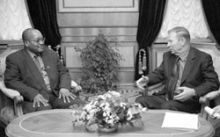Jacob Zuma, Deputy President of the Republic of South Africa, visiting Kyiv along with a large governmental delegation, is likely to give a fresh impetus to cooperation between Ukraine and South Africa. Over the past several years, the relationship has been, mildly speaking, on the cool side. The trend became especially noticeable last year, specifically in trade and business exchanges.
Jacob Zuma believes that relations between Ukraine and South Africa “will further expand and deepen” in both the political and economic sphere. South Africa is interested in deepening cooperation with Ukraine also in the military and military technological domains, as confirmed by that country’s Deputy Defense Minister Nozizwe Madlala-Routledge. In an interview with UNIAN she stated that her country could help Ukraine’s presence on African markets.
It is common knowledge that, in terms of cooperation, Africa is terra incognita to Ukraine. While Ukraine’s exports to CIS states constitute 34.5% of its total exports, to Europe 31.3%, to Asia 21.4%, and to the Americas 7.8%, Africa receives a mere 5%. This a miserable figure showing that Asian and African markets are practically ignored by Kyiv, either out of fear of establishing economic contact with even less stable countries, or for want of information about their needs and capabilities. At the same time, there are numerous empty market niches in a number of African and Asian markets that, if and when filled by Ukraine, would bring substantial income. This is primarily true of military industrial cooperation and machine-building. In this sense, Ukraine’s currently most strategic targets are India, Pakistan, Egypt, China, Turkey, and Vietnam. Kyiv tries to maintain a political (military, economic, etc.) dialogue with them. The RSA, coming to the fore in the south and all over the continent, has been practically left out of Kyiv’s range, although repeated bilateral government meetings ought to have shown the contrary. Meanwhile, such contacts are markedly unstable. Year in and year out, RSA-Ukrainian commodity exchanges have registered ups and downs. Last year, Ukrainian exports to the RSA amounted to $3.84 million US; a year earlier some $7 million. The State Statistics Committee says such exports have almost doubled in the first half of this year at $3.1 million.
Commenting on Vice President Zuma’s visit, First Vice Premier Yuri Yekhanurov stressed that ten bilateral documents have been signed by Kyiv and Pretoria; 22 documents are being considered by both sides. It is also true that such paperwork, so loved by official Kyiv, does not suffice. For one thing, South African experience in fuel technologies and mining would be very useful for Ukraine.
The Day’S REFERENCE
The first political dialogue bet ween the RSA and Ukraine took place in November 1991, when Kyiv played host to South African Foreign Minister Roelof Botha. Diplomatic relations were established on March 16, 1992. In 1997, Kyiv was again visited by the Foreign Minister, this time Alfred Nzo. Two years later, Ukrainian Foreign Minister Borys Tarasiuk paid an official visit to the RSA, meeting with leading political and business figures, presenting President Nelson Mandela with Ukraine’s highest award, Order of Prince Yaroslav the Wise, First Class.







